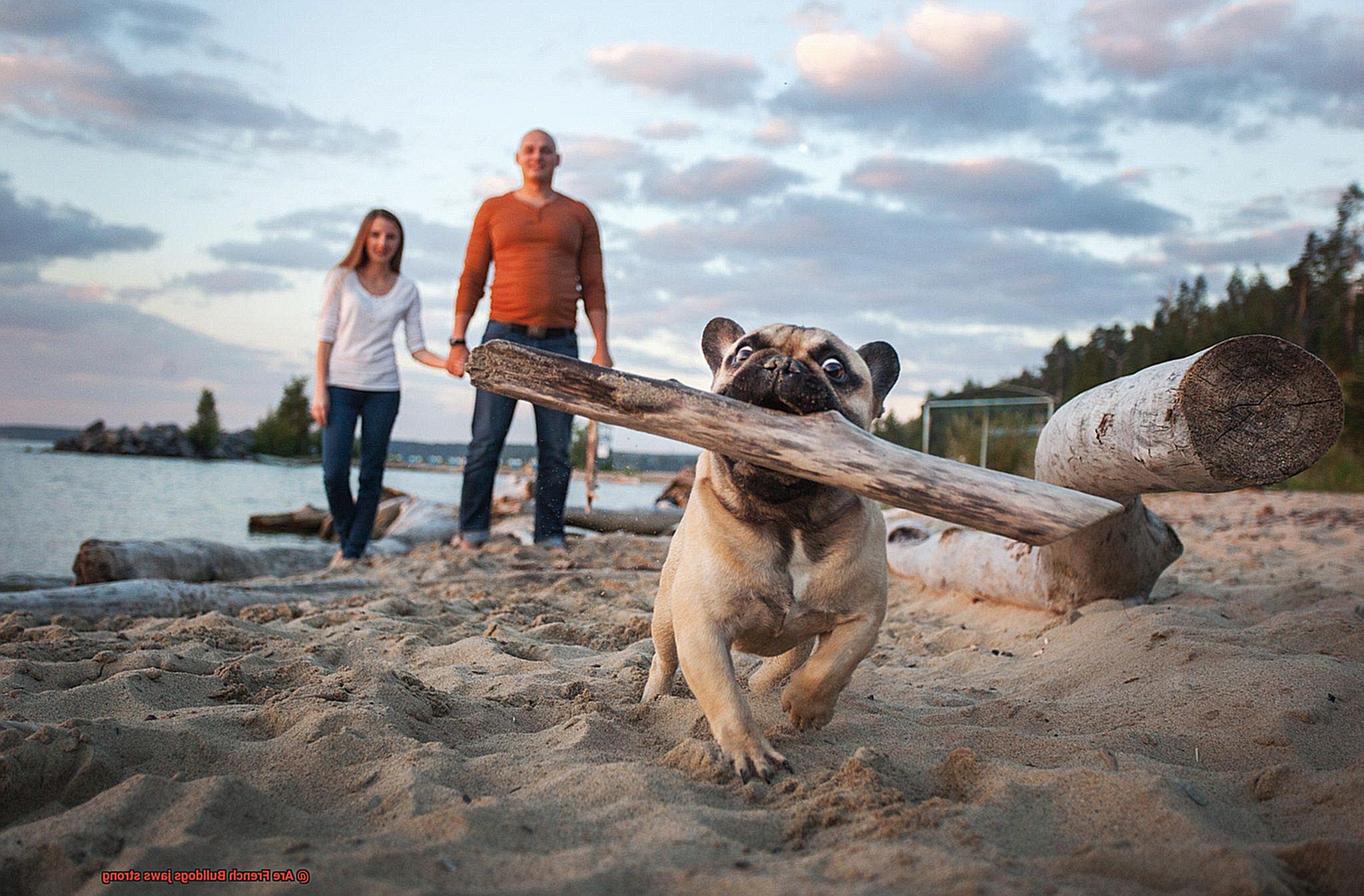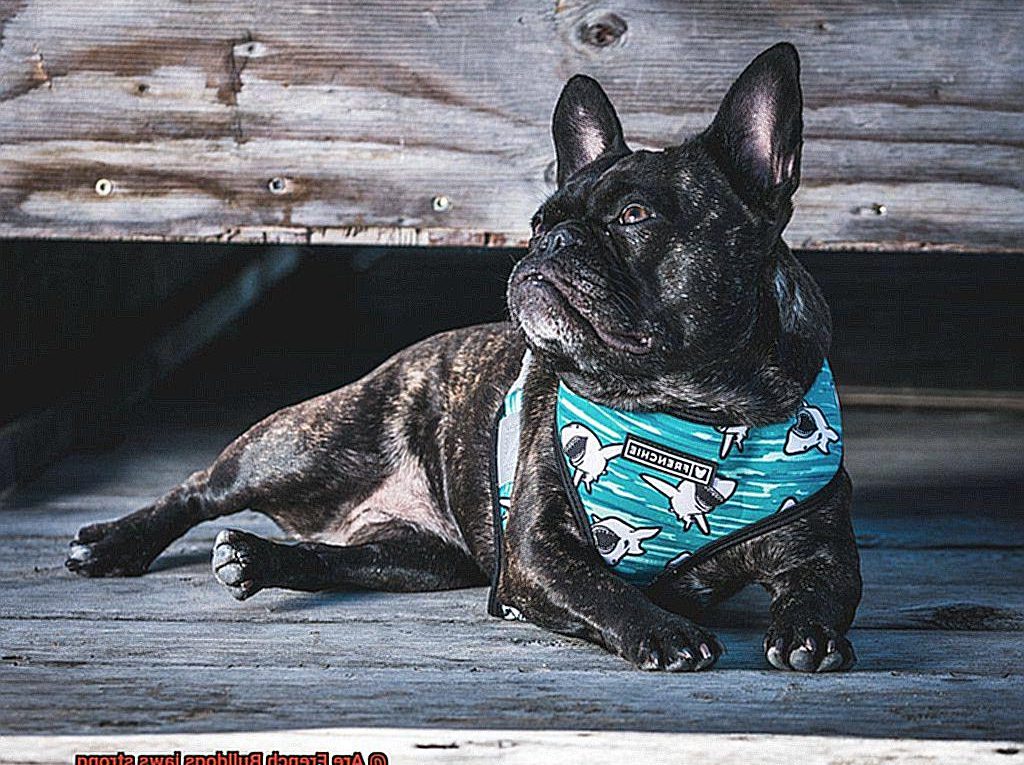Are French Bulldogs jaws strong?
Today, we’re diving headfirst into the captivating world of French Bulldogs and their jaw-dropping jaw strength. If you thought these cute-as-a-button pups were all about snuggles and snorts, get ready to have your mind blown by their hidden power.
Sure, French Bulldogs might not have the bulging biceps of their bigger buddies, but don’t let their compact frames fool you. These little dynamos pack a punch with jaws that defy logic. As we dig deeper into the wonders of these pint-sized firecrackers, we’ll uncover the secrets and abilities of their formidable chompers.
Join us on this eye-opening adventure as we unravel the truth behind the strength of French Bulldog jaws. Whether you’re a die-hard Frenchie fanatic or just curious about these tiny powerhouses, be prepared to have your beliefs shattered and your admiration skyrocket.
Are French Bulldogs jaws strong
Contents
- 1 Are French Bulldogs jaws strong
- 2 Exploring the Ancestry of French Bulldogs
- 3 The Strength of a French Bulldog’s Bite Force
- 4 Training and Socializing Your French Bulldog
- 5 Dental Care for French Bulldogs
- 6 Common Misconceptions About French Bulldog Jaw Strength
- 6.1 Misconception #1: French Bulldogs have a bite force comparable to larger dog breeds like the Pitbull or Rottweiler.
- 6.2 Misconception #2: French Bulldogs are aggressive or dangerous due to their perceived strong jaw strength.
- 6.3 Misconception #3: Chewing or mouthing behavior in French Bulldogs indicates a strong jaw.
- 7 How to Test the Strength of Your Dog’s Jaws
- 8 Tips for Keeping Your Dog’s Jaws Healthy and Strong
- 9 Conclusion
In this pawsome guide, we’ll dive deep into the world of French Bulldog jaws to uncover their hidden strength. So, grab a croissant and let’s get started.
The Anatomy of a French Bulldog’s Jaw:
French Bulldogs have a unique brachycephalic skull shape, meaning their heads are short and broad with flat faces. This adorable feature can sometimes lead to dental issues such as overcrowding or misaligned teeth.
While these concerns may affect the overall strength of their jaws, fear not. French Bulldogs still possess well-developed jaw muscles that allow them to chew and bite with reasonable force.
The Bite Force Factor:
While our little Frenchie friends may not match the bite force of larger breeds like Pit Bulls or Rottweilers, they still pack a punch. Though there is limited research specifically focused on French Bulldog bite force, it is generally believed that they have a moderate bite force compared to other dog breeds. So, don’t underestimate those tiny jaws.
From Ancient Ancestors to Gentle Companions:
French Bulldogs are descendants of the Molossus breed, known for their muscular build and powerful jaws. While Frenchies have been bred over time to be more companion animals than working dogs, they’ve retained some of their ancestors’ physical traits. This means that while they may not have the same level of jaw strength as their predecessors, they still possess a reasonably strong bite.
Dental Care for Stronger Jaws:
To ensure your Frenchie’s jaws stay strong and healthy, dental care is essential. Regular check-ups and cleanings are crucial to prevent dental issues that could weaken the jaw structure. Don’t forget to provide appropriate chew toys and treats to strengthen those jaw muscles and maintain oral hygiene. After all, a strong jaw starts with a pearly white smile.
Exploring the Ancestry of French Bulldogs
But have you ever wondered about the hidden strength behind those tiny jaws? In this guide, we’ll explore the fascinating ancestry of French Bulldogs and how their strong jaws are related.
Ancestry: From England to France:
Contrary to their name, French Bulldogs actually trace their roots back to England. During the 18th and 19th centuries, English Bulldogs were popular in England, known for their large size and muscular build. These English Bulldogs possessed strong jaws that were crucial for bull-baiting, a cruel sport that involved subduing bulls. As bull-baiting became illegal, breeders focused on creating smaller versions of the breed, which eventually led to the development of French Bulldogs.
The Evolution of Jaws:
To create French Bulldogs, breeders crossed smaller English Bulldogs with other small dog breeds like terriers and pugs. This selective breeding resulted in a new breed that retained some physical traits of their English ancestors. While they may not have the same powerful jaws as English Bulldogs, French Bulldogs still possess a considerable amount of bite force.
The Purpose of Strong Jaws:
French Bulldogs use their strong jaws for various purposes. Firstly, their biting strength enables them to chew and eat their food effectively, promoting proper digestion. Additionally, their powerful jaws allow them to hold onto toys or objects during playtime, showcasing their tenacious nature.
Caring for French Bulldog Jaws:
While French Bulldogs are known for their friendly and affectionate nature, it’s important for owners to be aware of their pet’s jaw strength and take appropriate precautions. Providing them with suitable toys that are safe for chewing can help prevent dental issues or damage. Regular dental care, such as teeth brushing and professional cleanings, is also crucial for maintaining their oral health.
The Strength of a French Bulldog’s Bite Force
The Mighty Bite of a French Bulldog: Unleashing the Power of Those Pint-Sized Jaws.
Have you ever wondered how strong the bite force of a French Bulldog really is? Well, let me tell you, these little dogs may be small in size, but their jaws pack a powerful punch. So, grab a cup of coffee and get ready to be amazed by the strength of those mighty chompers.
Genetics and breeding history play a significant role in the strength of a French Bulldog’s bite force. These adorable pups were originally bred for bull-baiting, a sport that required them to clamp down on a bull’s nose and not let go. This intense task required immense strength in their jaws, and over generations of breeding, their bite force became one of their defining characteristics.
French Bulldogs have short and wide jaws with strong muscles, allowing them to exert considerable pressure when they bite down. While they may not have the same bite force as larger dog breeds like German Shepherds or Rottweilers, they still have a powerful bite for their size. On average, the bite force of a French Bulldog is estimated to be around 305 pounds per square inch (psi), which is considered above average compared to other small dog breeds.
But here’s something interesting – French Bulldogs have a high pain tolerance. This means that even if they are using a lot of force when biting, they may not show signs of discomfort. However, it’s crucial for owners to be aware of their dog’s bite strength and train them properly to avoid any potential issues or accidents.
To keep those powerful chompers in top shape, regular dental care is essential. Just like humans, French Bulldogs need their teeth cleaned regularly to prevent dental problems. Providing appropriate chewing toys can also help strengthen their teeth and jaws while satisfying their natural chewing instincts.
Training and Socializing Your French Bulldog
In this blog post, we’ll delve into the essential aspects of training and socializing your French Bulldog. As an expert in canine behavior, I will share my insights based on years of experience and first-hand knowledge. So, grab a treat and let’s get started.
Start Training Early:
French Bulldogs are like little sponges eager to soak up knowledge. Begin training your Frenchie from a young age to establish a strong foundation. Use positive reinforcement techniques, such as treats and praise, to encourage good behavior. Keep training sessions short and frequent to maintain their attention span.
Consistency is Key:
Consistency is crucial in training your Frenchie. Ensure that everyone in the household uses the same commands and techniques. This avoids confusion and helps your Frenchie understand what is expected of them. Remember, repetition is the key to success.
Socialization – The Key to Confidence:
Introduce your French Bulldog to various people, animals, and environments to foster confidence and prevent fearfulness or aggression. Expose them to different sounds, sights, and smells, gradually increasing the level of stimulation. Regular walks in different neighborhoods, visits to dog parks, and playdates with other dogs are excellent ways to socialize your Frenchie.
Leash Training Made Easy:
French Bulldogs can be stubborn when it comes to leash training. Start by introducing them to a collar or harness at a young age. Gradually progress to leash training using positive reinforcement techniques. Reward them for walking calmly without pulling on the leash. Remember to use a harness rather than attaching the leash directly to their collar due to their respiratory predisposition.
Quality Time and Mental Stimulation:
French Bulldogs thrive on human companionship and need plenty of mental and physical stimulation. Incorporate them into your daily routines and ensure they have interactive toys, puzzle feeders, and regular play sessions. This prevents boredom and reduces the likelihood of destructive behaviors.
Seek Professional Help:
If you encounter specific behavioral challenges or need extra guidance, don’t hesitate to seek professional help. Enroll your Frenchie in obedience classes or consult with a professional trainer who specializes in French Bulldogs. They can provide valuable insights tailored to your dog’s needs.
Conclusion:
Training and socializing your French Bulldog are essential for their well-being and behavior. By starting early, being consistent, and providing proper outlets for their energy, you can raise a well-rounded Frenchie that brings joy to your life. Remember, each Frenchie is unique, so adapt your training approach accordingly. With love, patience, and expert guidance, your French Bulldog will become a cherished member of your family.
Dental Care for French Bulldogs
Proper dental care is vital to keep your Frenchie’s teeth healthy and their kisses fresh. In this article, we’ll delve into the world of dental care for French Bulldogs, providing you with valuable insights and tips to ensure your furry friend maintains a dazzling smile.
Overcrowding: A Common Issue
French Bulldogs have strong jaws, but their short-muzzled faces often lead to overcrowding in their mouths. This crowding makes it challenging to clean between teeth, leading to increased plaque and tartar buildup. Regular dental cleanings by a veterinarian are essential to prevent dental diseases like periodontal disease.
Periodontal Disease: Not Just for Humans
Periodontal disease affects the gums and supporting structures of the teeth. Due to their compact jaw structure, French Bulldogs are particularly susceptible to this condition. Regular brushing at home using dog-friendly toothbrushes and toothpaste can help remove plaque and reduce the risk of periodontal disease.

Chew Toys: More Than Just Fun
Providing appropriate chew toys is another way to maintain good dental health in French Bulldogs. These toys satisfy their natural chewing instincts while aiding in the removal of plaque and tartar buildup. Look for toys specifically designed for dental care, featuring ridges or bristles that clean teeth as they chew.
Regular Dental Check-ups: A Must
Regular dental check-ups with your veterinarian are crucial for early detection of any potential dental issues. During these visits, your vet will examine your Frenchie’s teeth and gums, perform professional cleanings if necessary, and address any concerns or questions you may have about dental care.
Common Misconceptions About French Bulldog Jaw Strength
Misconception #1: French Bulldogs have a bite force comparable to larger dog breeds like the Pitbull or Rottweiler.
Contrary to popular belief, French Bulldogs do not have a bite force that is on par with larger and more powerful breeds like Pitbulls or Rottweilers. While French Bulldogs may have a strong grip, their actual bite force is relatively weaker. This is primarily due to their brachycephalic muzzle structure, which limits the space available for strong jaw muscles to develop.

Misconception #2: French Bulldogs are aggressive or dangerous due to their perceived strong jaw strength.
In reality, French Bulldogs are generally friendly and affectionate towards humans and other animals. Their small size and gentle temperament make them more suitable as companion dogs rather than guard dogs. It is important to understand that any dog’s behavior is shaped by training, socialization, and individual temperament, rather than the strength of their jaw.
Misconception #3: Chewing or mouthing behavior in French Bulldogs indicates a strong jaw.
French Bulldogs, like all dogs, may exhibit chewing or mouthing behaviors. However, these are normal canine behaviors and are not necessarily indicative of a strong jaw. It is important for owners to provide appropriate chew toys and redirect their natural chewing instincts in a positive way. Care should be taken not to provide them with toys or treats that are too hard or small, as this can pose a choking hazard.
How to Test the Strength of Your Dog’s Jaws
Well, wonder no more. In this blog post, we’ll explore some fun and safe ways to test your furry friend’s jaw strength. From bite force tests to tug-of-war games, we’ve got you covered. Let’s dive in and unleash the power of those adorable little jaws.
Bite Force Test:
First up, let’s measure that bite force. Get a bite force gauge or a fish scale and have your pup sit or lie down calmly. Offer them a sturdy chew toy or a thick rope, and gently pull on it while they give it their best chomp. Watch out for that mighty force and measure it with the gauge or scale. It’s like a superhero strength test for your furry sidekick.
Tug-of-War Games:
Who doesn’t love a good game of tug-of-war? Grab a durable tug toy made especially for dogs and engage in some friendly competition with your French Bulldog. Feel their powerful grip and resistance as you both pull on the toy. It’s an exciting way to test their jaw strength while having a blast together.
Chew Toy Challenges:
Watch your dog in action as they chew on tough toys or bones. Can they effortlessly crunch through hard treats? Do they have a vice-like grip on their toys? These jaw-dropping observations can give you insights into the strength of their jaws. It’s like watching a champion weightlifter at work.
Safety First:
Remember, safety always comes first. Use appropriate toys and equipment, and never force your dog to participate in any activity they’re uncomfortable with. If you have any concerns about your dog’s jaw strength or if they show signs of pain or discomfort while chewing, consult with a veterinarian for professional advice. We want to keep those adorable jaws healthy and strong.
Tips for Keeping Your Dog’s Jaws Healthy and Strong
French Bulldogs are known for their adorable appearance and unique features, including their strong jaws. While they may not have the same bite force as larger breeds, it is still important to prioritize their dental health. In this article, we will discuss the importance of dental care, chew toys, and a balanced diet for keeping your French Bulldog’s jaws healthy and strong.
Regular Dental Care:
Just like humans, dogs need regular dental care to maintain healthy and strong jaws. Brushing your French Bulldog’s teeth two to three times a week with a dog-specific toothbrush and toothpaste helps remove plaque and tartar buildup that can weaken their jaws over time.
Providing Chew Toys and Dental Treats:
Chewing is a natural behavior for dogs and an excellent exercise for their jaws. Offering appropriate chew toys and dental treats helps strengthen their jaw muscles and promotes good oral health. Look for toys designed to promote dental hygiene, such as those with ridges or textures that clean teeth as they chew.
Balanced Diet:
A well-balanced diet plays a crucial role in maintaining overall health, including strong jaws. Ensure your French Bulldog’s diet includes high-quality protein, essential vitamins, and minerals. Consult with your veterinarian to determine the best diet plan based on their specific needs.
Regular Veterinary Check-ups:
Routine visits to the veterinarian are essential for monitoring oral health. Dental examinations can detect any signs of dental issues and prompt appropriate treatments or preventive measures. Professional cleanings may be recommended to remove stubborn plaque or tartar buildup.
Avoid Excessive Hard Chewing:
While chew toys are beneficial, excessive hard chewing can damage teeth and weaken jaw muscles. Provide safe and suitable chew toys based on your dog’s size and breed, discouraging chewing on inappropriate items.
Recognize Signs of Dental Problems:
Being aware of dental problem signs is crucial for early detection and treatment. Watch for symptoms such as bad breath, swollen or bleeding gums, difficulty eating or chewing, excessive drooling, and teeth discoloration. Prompt veterinary care prevents further damage to their jaws and oral health.
m7C446_OEOQ” >
Conclusion
In conclusion, although French Bulldogs may not possess the same jaw strength as larger dog breeds, their jaws are still remarkably strong given their size. Thanks to their unique brachycephalic skull shape and well-developed jaw muscles, they have the ability to chew and bite with considerable force. While there is limited research specifically dedicated to measuring French Bulldog bite force, it is widely believed that they exhibit a moderate level of strength compared to other small dog breeds.
French Bulldogs trace their lineage back to the Molossus breed, renowned for their robust build and powerful jaws. Despite being bred primarily as companion animals rather than working dogs, these lovable pups have retained some of the physical traits of their ancestors. Consequently, while they may not possess the exact same jaw strength as their predecessors, they still boast a formidable bite.
To ensure your French Bulldog maintains strong and healthy jaws, regular dental care is imperative. Consistent check-ups and cleanings performed by a veterinarian are crucial in preventing dental issues that could weaken the structure of the jaw. Additionally, providing appropriate chew toys and treats can aid in strengthening those jaw muscles while promoting optimal oral hygiene.
Overall, although French Bulldogs may not reign supreme in terms of jaw strength within the canine kingdom, they undeniably possess a substantial amount of bite force relative to their size.




